 |
| ASK
GENO |
| SEARCH |
| |
|
| |
|
|
| |
|
|
| |
|
| |
| |
|
|
| |
| |
|
|
| |
| |
|
|
| |
| |
|
|
| |
|
|
|
|
| |
| |
| |
| |
| |
ROUTE
66
"The
Mother
Road"
|
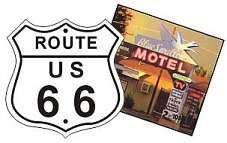 |
|
| No
road has more appeal than legendary
Route 66. Route 66 is a uniquely
American phenomenon that invites fans
from all over the U.S. and the world
to follow its path. Why? Because Route
66 is more than a strip of pavement,
it is a state of mind. It is a fascinating
mix of American history, nostalgia,
adventure, and the open road. |
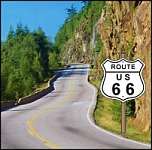 |
Route
66 is 2,448 miles from Chicago
to L.A. with unbeatable scenery,
Mom-and-Pop diners, trading
posts and outrageous road-side
attractions. Route 66 is a journey
to the heart of America: travelers
who'll stop to help change a
tire, waitresses in starched
pink uniforms who serve an extra
piece of pie when you're down
to your last dollar, traveling
salesmen with the latest jokes,
and truck drivers who helped
grateful hitchhikers.
|
|
| It
was the jukebox era. A time
of malt shops, pinball machines
and sleek Detroit Iron. A time
when the first cross-country
highway to link Chicago and
Los Angeles gave birth to more
songs, stores and media legends
than any road before or since.
However, despite all the wonderful
vehicles and beautiful scenery,
it was people who made Route
66 what it was. |
 |
|
 |
Route
66 which began in 1926 as
the highway from Chicago to
Los Angeles was created by the
demands of a rapidly changing
America. John Steinbeck proclaimed
Route 66 the "Mother Road."
Steinbeck's classic 1939 novel
served to immortalize Route
66 in the American consciousness.
|
|
| The
War Department needed improved
highways for rapid mobilization
during war time and to promote
national defense during peace
time. At the outset of American
involvement in World War II,
the War Department singled out
the West as ideal for military
training bases in part because
of its geographic isolation.
Route 66 helped to facilitate
the single greatest war time
manpower mobilization in the
history of the nation that created
thousands of civilian jobs.
|
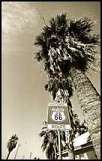 |
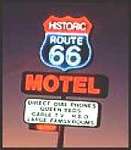 |
The
evolution of tourist facilities
is shown in the roadside architecture
along Route 66. Most Americans
who drove Route 66 did not stay
in hotels. They preferred the
motel accommodations that emerged
from automobile travel. Motels
evolved from earlier features
of the American roadside such
as the auto camp and the tourist
home. |
| Most
gas stations evolved from
the simplest "filling station"
concept to a house with one
or two service pumps in front
and then became more elaborate,
with service bays and tire outlets.
In the early years of Route
66, service station prototypes
were developed and then were
adopted across the country.
|
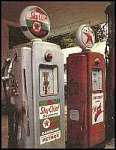 |
|
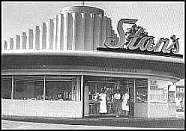 |
By
1970, nearly all segments of original
Route 66 were replaced by a modern
four-lane highway. The outdated, poorly
maintained vestiges of U.S. Highway
66 completely succumbed to the interstate
system in October 1984 when the final
section of the original road was replaced
by Interstate 40 at Williams, Arizona.
|
| Route
66 looks forward to its 75th Birthday
in 2001 and its contribution to
the nation must be evaluated as a
social and cultural history of America.
Route 66 shared unparalleled economic
strife and global instability on the
American scene, yet it stimulated
the most comprehensive westward movement
and economic growth in United States
history. |
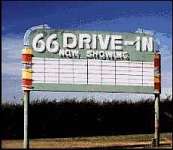 |
 |
Like
the early, long-gone trails of
the late 19th century, Route 66 helped
to spirit a second and perhaps more
permanent mass relocation of Americans.
Route 66 symbolized the renewed spirit
of optimism in the U.S. after economic
catastrophe and global war. Often
called, "The Main Street of America",
it linked a remote and under-populated
region with two vital 20th century
cities - Chicago and Los Angeles.
|
| You’ll
find that traveling legendary
Route 66 is all this: new experience,
self-discovery, music, and a sense
of being part of living history. So
dust off that dream of seeing what's
just around the next bend, gas up
the old car and head on down the world's
most enchanting highway..Route
66. |
 |
| Now
you can wear 2,448 miles of history
on your wrist! |
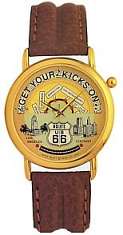 |
Bobby
Troup, world famous songwriter,
composer, actor and former pianist
with the Tommy Dorsey band, penned
a lyrical road map of the legendary
road in which the words, "Get Your
Kicks On Route 66" became a catch
phrase for countless motorists who
moved back and forth between Chicago
and the Pacific Coast. The popular
recording was released in 1946 by
Nat King Cole one week after Troup's
arrival in Los Angeles....and
now it's on a watch! |
|
For more information on how
to purchase the famous Bobby Troup
Route 66 Limited Edition watch......................Click
Here |
. |
|
To
see more Route 66 collectible
watches.................Click
Here
|
 |
|
|
|
|
|
|
|